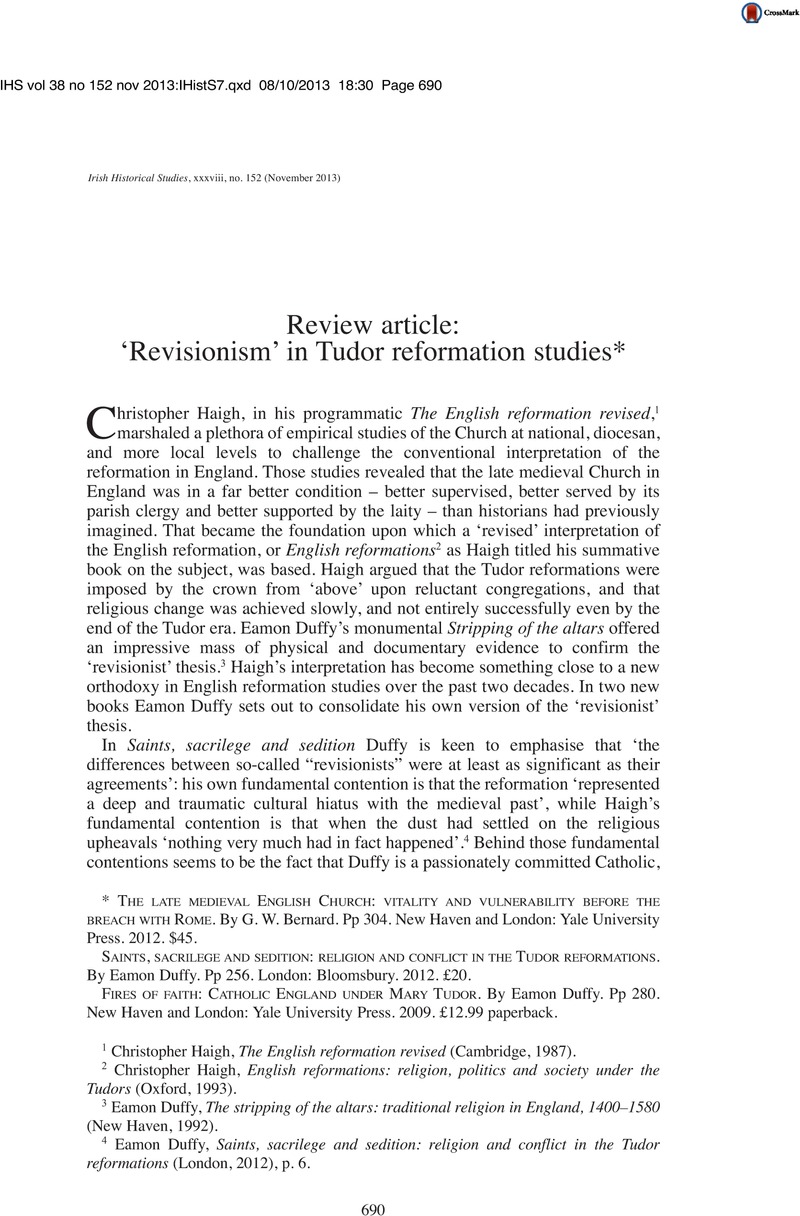Published online by Cambridge University Press: 04 February 2015

[THE LATE MEDIEVAL ENGLISH CHURCH: VITALITY AND VULNERABILITY BEFORE THE BREACH WITH ROME. By BernardG. W.. Pp 304. New Haven and London: Yale University Press. 2012. $45.
1 Haigh, Christopher The English reformation revised (Cambridge, 1987).CrossRefGoogle Scholar
2 Haigh, Christopher English reformations: religion, politics and society under the Tudors (Oxford, 1993).Google Scholar
3 Duffy, Eamon The stripping of the altars: traditional religion in England, 1400–1580 (New Haven, 1992).Google Scholar
4 Duffy, Eamon Saints, sacrilege and sedition: religion and conflict in the Tudor reformations (London, 2012), p. 6.Google Scholar
5 Ibid., p. 5.
6 Ibid., pp 8–9.
7 Ibid., p. 7.
8 MacCulloch, Diarmaid review of Saints, sacrilege and sedition in The Guardian, 27 July 2012.Google Scholar
9 Duffy, Saints, sacrilege and sedition, p. 34.Google Scholar
10 Ibid.
11 ibid., p. 51.
12 Ibid., p. 14.
13 Ibid., p. 194.
14 Duffy, Eamon Fires of faith: Catholic England under Mary Tudor (New Haven and London, 2009).Google Scholar
15 ibid., p. 7.
16 Ibid., p. 79.
17 ibid., p. 170.
18 Ibid., p. 7.
19 ibid., p. 79.
20 Bernard, G.W. The late medieval English Church: vitality and vulnerability before the breach with Rome (New Haven and London, 2012).Google Scholar
21 ibid., pp 71, 86.
22 ibid., p. 69.
23 ibid., p. 73.
24 ibid.
25 ibid., p. 49.
26 ibid., p. 67.
27 ibid., p. 51.
28 ibid., p. 117.
29 ibid., p. 125.
30 ibid., p. 116.
31 ibid., pp 236–7.
32 ibid., p. 48.
33 Shagan, Ethan A. Popular politics and the English reformation (Cambridge, 2003), pp 10, 17.Google Scholar
34 ibid., p. 306.
35 ibid., pp 23, 303.
36 ibid., p. 307.
37 Duffy, ‘The English reformation after revisionism’ in ‘Recent trends in the study of Christianity’, Renaissance Quarterly, 59, no. 3 (Fall, 2006), p. 726.CrossRefGoogle Scholar
38 Jefferies, Henry A. The Irish Church and the Tudor reformations (Dublin, 2010), pp 25–35, 57–61, 63–4.Google Scholar
39 ibid., pp 45–53.
40 Clabaigh, Colmán Ó The friars in Ireland, 1224–1540 (Dublin, 2012), pp 53 et seq.Google Scholar
41 Jefferies, The Irish Church, pp 128–31.Google Scholar
42 Ibid., pp 130–1, 136–42.
43 Brady, W.M. State papers concerning the Irish Church (London, 1868), no. v.Google Scholar
44 Jefferies, The Irish Church, pp 138–42.Google Scholar
45 ibid.
46 Murray, James Enforcing the English reformation in Ireland: clerical resistance and political conflict in the diocese of Dublin (Cambridge, 2009), p. 282.CrossRefGoogle Scholar
47 Jefferies, The Irish Church, pp 206–7.Google Scholar
48 Ibid., pp 135–6.
49 ibid., pp 280–1.
50 Brady, State papers, no. lxix.Google Scholar
51 T.N.A., SP 63/207, pt 4/ 3.
52 T.N.A., SP 63/207, pt 6/ 126.
53 Haigh, Christopher ‘So why did it happen?’ in The Tablet, 20 Apr. 2002.Google Scholar